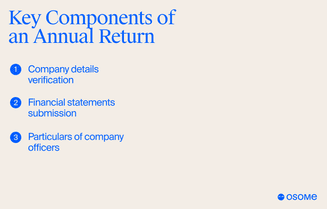Your Step-by-Step Guide to Annual Return Filing
- Modified: 10 December 2025
- 10 min read
- Grow Your Business


Gabi Bellairs-Lombard
Author
Gabi's passionate about creating content that inspires. Her work history lies in writing compelling website copy and content, and now specialises in product marketing copy. When writing content, Gabi's priority is ensuring that the words impact the readers. As the voice of Osome's products and features, Gabi makes complex business finance and accounting topics easy to understand for small business owners.

Nisah Rahim
Reviewer
Nisah Rahim is our go-to expert reviewer for all things Corporate Secretary-related in Singapore. As the Corporate Secretary Team Lead and content reviewer, Nisah meticulously examines our blog posts to ensure we provide comprehensive information on Corporate Secretary services such as local regulatory compliance, managing board meetings, maintaining company records, and providing expert advice on corporate governance matters.

Imran Marican
Reviewer
Imran Marican, ATA SCTP member, is our Corporate Tax Assistant Manager based in Singapore, with almost a decade of experience in Singapore corporate tax. With in-depth knowledge of Singapore corporate tax law and regulations, he can help with corporate tax compliance that matters to every company. While our business writers transform complicated tax jargon into easy-to-understand concepts, as a reviewer for the Osome blog, Imran ensures our content is accurate and relevant, helping our readers boost their businesses with helpful tips and insights.
Meeting the annual return filing deadline is critical for every local company in Singapore.
This guide cuts through the confusion and provides a clear, concise roadmap to ensure your company complies with Singapore’s statutory regulations on time. Learn the exact steps, documents required, and key dates to stay compliant with the Accounting and Corporate Regulatory Authority and the Inland Revenue Authority of Singapore, without the last-minute rush.
Key Takeaways
- Annual return filing in Singapore is a legal requirement for companies to maintain updated information with the Accounting and Corporate Regulatory Authority and the Inland Revenue Authority of Singapore, which is crucial for transparency and avoiding penalties.
- Key components of an annual return include up-to-date company details, submission of financial statements and accurate particulars of company officers, all of which contribute to providing a clear picture of the company’s financial health and governance.
- For Singapore-incorporated companies, annual returns must be filed within 7 months after the FYE. AGMs or written resolutions should be completed within 6 months, once financial statements are prepared. To stay compliant with these timelines and IRAS tax filing obligations, many companies turn to professional assistance.
What Is Annual Return Filing?
Annual return filing is a legal obligation for Singapore-incorporated companies to keep their information current with the Accounting and Corporate Regulatory Authority (ACRA), thereby ensuring stakeholders are informed about the company’s composition, business activity and financial health. The process involves several stages, from the preparation and submission of accounting and financial statements to holding the company's annual general meeting. It’s not just about ticking boxes; it’s about demonstrating your company’s commitment to transparency and good governance.
Failure to file your annual returns by the required date can lead to enforcement actions against your executive officers. Therefore, it’s crucial to understand the annual filing requirements and adhere to them. But don’t fret; we’re here to guide you through this journey, one step at a time.
Let us help you navigate the annual return filing process efficiently and effectively. Contact us today to ensure your company remains in good standing with ACRA!

The role of ACRA
Firstly, let’s take a moment to understand the role of ACRA in this process. ACRA is the governing body responsible for ensuring compliance with the Companies Act in Singapore. They oversee the annual filing process, ensuring that all locally incorporated companies adhere to the regulations and file annual returns timely. Failure to comply with these requirements can result in enforcement actions against the executive officers.
Therefore, understanding ACRA’s role is the first step toward successful annual returns filing.
The role of IRAS
Next in line is the Inland Revenue Authority of Singapore (IRAS). IRAS is responsible for the assessment and collection of corporate income tax in Singapore, ensuring companies meet their tax obligations. It requires companies to:
- File two corporate income tax returns annually: the Estimated Chargeable Income (ECI) and the Form C-S/Form C-S (Lite)/Form C
- File the ECI within three months from the ending date of a company’s financial year
- File the actual income tax return by November 30 each year
These filings have to be done within strict adherence to each date to avoid penalties.
Having a clear understanding of IRAS’s role is crucial in navigating your return filing journey.
File annual returns with ACRA after your AGM to stay compliant, and don’t forget your tax obligations with IRAS: submit the ECI within three months after FYE and your income tax return by 30 November. If you have GIRO set up and file your ECI by the 26th of the third month after FYE, you can enjoy paying your taxes in instalments — easing cash flow for your business.
Key Components of an Annual Return
Now that we’ve understood the roles of ACRA and IRAS, let’s delve into the key components of an annual return. At its core, an annual return is about providing accurate, up-to-date information about your company to the relevant authorities. It requires the local or foreign company to file accounting and financial statements, such as the balance sheet, income statement, and cash flow statement, by a stipulated date. These reports must comply with Singapore Accounting Standards, ensuring consistency, transparency, and reliability of information, especially for foreign-owned businesses.
In addition to financial statements, an annual return also includes your company’s shares details.
Your company's shares details will include the number of shares held, issued share capital, and the paid-up share capital. Let us briefly look at each of these terms:
- Number of shares held – The number of shares held refers to the total number of shares that each shareholder owns in a company.
- Issued share capital – This is the total value of shares that a company has issued (sold) to shareholders. It is calculated by multiplying the number of shares issued by their nominal (or par) value.
- Paid-up share capital – This refers to the portion of the issued share capital that has been fully paid for by the shareholders. If a company issues shares at a certain price and the shareholders pay this amount in full, those shares are considered "fully paid." In actual terms, paid-up share capital represents the actual funds received by the company from members in exchange for shares.

These financial particulars about your company (whether it's a local or a foreign company) are crucial in providing a complete picture of its financial health.
Another crucial component is the Management Discussion and Analysis (MD&A) of a business. This is a section of your annual report or quarterly filing where the management submits a narrative explanation of the accounting and financial statements to the company's stakeholders. It offers the management's perspective on the company's financial performance, condition, and particulars of future prospects.
Company details verification
One of the key components of an annual return is the verification of the company's information. This involves a company details confirm process, ensuring the accuracy of your company’s information with ACRA, such as business activities, registered office address, and share capital. The importance of this process cannot be overstated.
Having accurate and up-to-date company details on ACRA’s register is a legal requirement and it also helps the company's stakeholders make informed decisions about your company.
File financial statements
Another critical aspect of an annual return is to file financial statements in each calendar year. Your company's financial statements provide a comprehensive overview of your company’s financial standing and include financial information such as:
- Equity
- Assets
- Liabilities
- Financial performance
- Changes in cash flow
All companies must prepare financial statements in accordance with Singapore Accounting Standards. However, exemptions apply for certain companies: only dormant companies or active but solvent small companies may be exempted from filing.
Ensure you know whether your company qualifies for exemptions. Dormant or small solvent companies might not need to submit financial statements, but preparing them can still help maintain accurate records and streamline future compliance.
Particulars of company officers
The annual return must also include the particulars of your company officers. This includes their details, such as:
- Full name
- Nationality
- Contact information
- Residential address
It’s crucial to ensure that these details are accurate and up-to-date, as they form part of the official records on the ACRA register.
Annual Return Filing Deadline and Penalties
The date your business is required to file the Annual Return is anytime within 7 months after the fiscal year-end (FYE). It’s essential to adhere to these deadlines, as missing them exposes directors and companies to late fees, red notices, and potential summonses from ACRA.
Now, let’s turn our attention to the ‘how.’ Return filing requirements can be quite complex, especially for businesses that are filing for the first time. But don’t worry, we’ve broken down the particulars for you.
Timelines
The filing deadlines for the Annual Return depend on your company’s Financial Year End (FYE). Typically, you’re required to lodge the return within 7 months after the FYE for most companies. However, there are some exceptions, depending on the company type; listed companies must file their Annual Returns within 5 months after their FYE, while unlisted companies have 7 months. Having a clear understanding of these timelines is crucial to ensure timely filing and avoid penalties.
Online declaration/filing via BizFile
The annual filing process has been simplified with the introduction of BizFile+, an online declaration and filing system operated by ACRA. You can lodge this online declaration of your Annual Return electronically through BizFile+, including details such as director names, members and the financial statement date.
This makes the process more efficient and less time-consuming, allowing you to focus on other important aspects of your business.
ACRA red notices: pre-warning for missed filings
ACRA has begun issuing “red notices” as a formal pre-warning to companies that miss their annual return filing deadlines. These notices are not summonses but indicate that the company may face further enforcement if the lapse is not addressed promptly. Companies should act immediately to resolve any missed filings to minimise the risk of penalties or other enforcement actions.
At Osome, we’ve seen clients get caught off guard by red notices – some didn’t realise these were formal warnings from ACRA before summonses. Make sure to file via BizFile+ by the deadline to avoid escalation. If you receive a red notice, treat it as a last call to file on time before enforcement begins.
Navigating a Company's Annual General Meeting AGM
Now, let’s explore another integral part of the return filing process - the company’s Annual General Meeting (AGM). As per the Companies Act, all Singapore-incorporated companies are required to hold an AGM, where important decisions are made and the financial statements are approved by the company's stakeholders.
However, organising an AGM can be a complex task, with several requirements, timelines, and potential penalties for non-compliance. But don’t worry! We’re here to guide you through it.

Holding AGMs – all requirements
Under Section 175 of Singapore’s Companies Act, companies are required to conduct an AGM. Your company must submit the date of its AGM along with its annual return. If a company convenes an AGM upon a member’s request, a ‘Notification of AGM’ must be filed through BizFile+.
Navigating these requirements can be challenging, but understanding them is crucial to ensure compliance.
Exemptions from holding AGMs
Private companies may be exempt from holding an Annual General Meeting (AGM) under certain conditions (Section 175A of the Companies Act). These exemptions apply if all members pass a resolution to forgo AGMs, if the company circulates its financial statements to members within five months following the financial year-end, or if the entity qualifies as a private dormant relevant company exempt from preparing financial statements. Such provisions offer companies greater flexibility in managing corporate governance while adhering to statutory requirements.
Example
XYZ Private Ltd., a small business in Singapore, qualifies for an exemption from holding an Annual General Meeting (AGM) under Section 175A of the Companies Act. All shareholders have agreed to waive the AGM by passing a resolution at a board meeting. Additionally, the company ensures that its financial statements are circulated to all members within five months of the financial year-end. As a result, XYZ Private Ltd. can skip the AGM and focus on more pressing business matters, while still adhering to statutory requirements and maintaining compliance.
AGM requirements may seem like just another formality, but they’re central to maintaining transparency and accountability. Staying on top of them helps ensure compliance and builds confidence among shareholders.

Corporate Secretary Team Lead
Annual general meeting, AGM timelines and penalties
The timelines for holding an AGM depend on your company’s financial year-end. For instance, Singapore private limited companies with a financial year ending before August 31, must hold their first AGM within 18 months of incorporation, and subsequent AGMs can be no more than 15 months apart.
Late lodgment penalties are issued for overdue filing of Annual Returns, with the possibility of further enforcement actions by ACRA.
Written resolutions as an alternative to the AGM
Did you know that written resolutions can serve as an alternative to AGMs?
According to the Companies Act, private companies in Singapore may opt for this route if all voting shareholders agree on dispensing with AGMs through written resolutions. However, incorporated companies are required to ensure that AGM-related matters, such as the distribution of all the documents, signed financial statements and resolutions, are handled within six months of the financial year-end date.
Need help with this process? Osome’s fast and hassle-free company incorporation services make compliance a breeze, giving you more time to focus on growing your business.
Tax Filing Obligations with IRAS
Beyond annual returns and AGMs, there’s another crucial part of the compliance puzzle - tax filing. Each business in Singapore is required to annually submit Estimated Chargeable Income (ECI) and a formal income tax return using either Form C-S, Form C-S (Lite), or Form C to IRAS.
Knowing your tax filing obligations is crucial to ensuring smooth sailing in your annual returns filing journey.
Filing ECI
Filing Estimated Chargeable Income (ECI) is a critical part of your tax filing obligations. The date to file ECI in Singapore is within three months after the end of their financial year. However, a waiver for ECI filing is available for companies with an annual revenue of $5 million or below, provided they have a nil ECI for the Year of Assessment.
Even if you qualify for the ECI waiver, you are still required to file the final tax return, which is due by 30 November the following year from your FYE.
Corporate income tax return forms
Depending on the company type, there are different types of corporate income tax return forms, including Form C-S, Form C-S (Lite), and Form C. The form to be used depends on your company’s category.
For the 2025 Year of Assessment, companies are granted a Corporate Income Tax Rebate of 50%, capped at a maximum of $40,000. The computation of the tax rebate is done automatically by the tax authority, based on the corporate income tax return forms that your company submits.
How Osome Can Help With Annual Return Filing in Singapore
With so many complexities involved in the process, it’s understandable to feel overwhelmed. But don’t worry, there’s help at hand. Hiring professional assistance, such as a registered filing agent or company secretary, can help streamline compliance for businesses and ensure accuracy in the return filing process.
Professional assistance not only simplifies the process but also helps you avoid the risk of penalties due to missing a filing date or non-compliance. Let’s take a closer look at how hiring professionals can benefit your business.
Benefits of hiring a registered filing agent
A registered filing agent provides a host of benefits, including:
- Streamlining compliance with Singapore’s business regulations
- Making the process of meeting statutory requirements more manageable\
- Allowing business owners to focus on other aspects of their company
- Providing transparent service rates that can potentially reduce costs
Osome offers tailored accounting packages for Singapore companies – explore our options and pricing here to find the best fit for your business.
Summary
In conclusion, the filing of annual returns is a multi-faceted process, encompassing a range of activities from verifying company details to submitting financial statements, holding AGMs, and fulfilling tax obligations. Navigating this process may seem daunting, but with a clear understanding of the documents involved, requirements, timelines and the help of professionals, it becomes a manageable task. The journey to compliance might be complex, but remember, it’s a journey that leads to transparency, good governance, and ultimately, the success of your business.
You could also make the day-to-day running of your company easier with a company secretary and accounting services from Osome.






